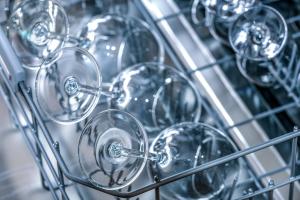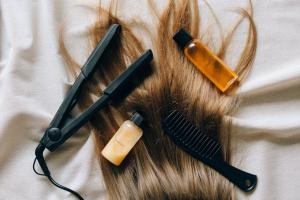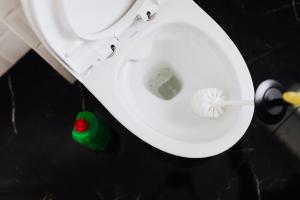
If you live in hard water area, you’re most likely very familiar with hard water stains, also known as limescale, mineral deposits, and soap scum. These stains can be a bit of a living nightmare, to say the least, when it comes to cleaning and trying to keep your appliances sparkling clean.
If you don’t have one of our water softeners installed, then hard water stains are probably prevailing in areas of your home where water runs frequently, such as skins, toilets, bathtubs, showers, and other parts of your house. They can be so stubborn to remove that you can end up wondering if there’s any getting rid of them. So, is there?
In this guide, we’ll explain exactly what hard stains are, why they appear, whether they’re permanent, and the best way to keep them under control.
At a glance:
- Hard water stains are mineral deposits left behind when water evaporates from a surface, such as you taps, shower doors and drinking glasses.
- Hard water stains can be removed with a good clean, but they will keep returning unless your water is softened.
- A water softener can remove the excess minerals in your water, reducing the amount of deposit build up left on your surfaces.
What Are Hard Water Stains?
Firstly, let’s address exactly what these hard stains are so we can access the best method of dealing with them. Hard water stains are mineral deposits, primarily calcium and magnesium, left behind when water evaporates from a surface. They commonly appear on glass, taps, faucets, and shower doors. When you live in a hard water area with high mineral content, the excess minerals remain on the surface, forming stubborn, cloudy spots and limescale.


Making the issue even worse, these minerals react with soap, exacerbating the problem and causing what’s also known as soap scum. Use our hard water map to check if you’re vulnerable to the effects of hard water.
Over time, these deposits can accumulate on your appliances, diminishing the aesthetic appeal of your home.
Can Hard Water Stains Be Removed, Or Are They Permanent?
No, the good thing is hard water stains are not permanent - phew! But, they can be a real pain to remove and become even more challenging to deal with when left to build up over time, making it a struggle to tackle head-on. The endless cleaning cycle can be a frustrating battle, which is why we always recommend considering a water softener.
Hard water stains can be removed, but their persistence depends on the duration and severity of their staining. Regular cleaning with white vinegar or lemon can help to control the issue. For more stubborn stains, follow our guide below, where we go into depth about the best ways to clean hard water stains from your shower doors.


If you want to learn how to clean limescale from your other appliances effectively, browse through our blog, where you’ll find a range of guides to follow.
How to Prevent Recurring Hard Water Stains
Preventing hard water stains from recurring involves managing the mineral deposits in your water supply. First and foremost, the most effective, reliable and easiest way to do this is to install one of our water softeners. Our water-softening system reduces the concentration of calcium and magnesium in your water, minimising the likelihood of stubborn stains, in turn reducing the amount of time and energy you spend cleaning - to do the things you actually want to!
There are many more perks to having a water softener in your home, such as better-tasting tea and coffee, healthier hair, smoother skin, and more.


Regular cleaning is crucial if you haven’t yet installed a water softener. Ensure you wipe down surface areas prone to hard water deposits frequently. Using a squeegee on glass shower doors and tiles after each use can prevent build-up. It’s essential to opt for cleaning products that work well at combating hard water stains - white vinegar, lemon, baking soda paste, and ammonia. Remember to use non-abrasive cleaning tools so you don’t damage or scratch your appliances.
By combining preventative measures, like water softeners, with targeted cleaning strategies, you can keep surfaces looking pristine and greatly minimise the impact of hard water on your fixtures and appliances.
We hope this guide has provided you with some clarity on hard water stains and valuable tips to help you deal with them. If you’d like to learn more about the benefits of soft water, visit our Kinetico website today.








